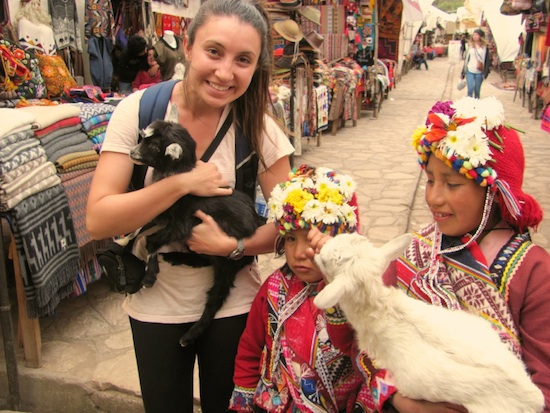5 Important Tips for Expats Living in Peru

Since living in Cusco, Peru, I have learned a lot about myself, Peruvian culture, and life as an expat. The most important skill I think I’ve acquired on my travels is the ability to adapt to new situations and environments. Adaptability and an open mind are things you should definitely bring with you if you want to get the most out of your time abroad.
I’ve broken down some of the main things I’ve learned to adapt to while abroad:
5 Important Tips for Expats Living in Peru
1. Cultural sensitivity
The varying social norms in developing countries I’ve been to always provoke conflicted feelings in me. On one hand, there are so many aspects that I find intriguing and appealing, such as the simplistic lifestyles and laid back attitudes of locals. However, the quality of social welfare systems and general infrastructure are really lacking in comparison to those of westernized countries, and it is certainly something that takes some adjusting to.
One particular thing I’ve seen in Peru that really affects me are all of the children on the street working to sell candy or finger puppets, or charging for pictures with surprisingly domesticated llamas. I try to be as open-minded as I can about cultural differences, but when I see very young children working instead of being in school, I can’t help but feel sad.
At the end of the day though, I have to remember that there will always be cultural differences in different parts of the world, and a big part of traveling abroad is expecting and adapting to them. The most important lesson I’ve learned is to accept what I can’t change and try my best to change things that are within my control.
2. Reverse racism
Being a gringo (white person) in a developing country is a 24/7 job. Locals instantly assume you are rich because you are white. This can manifest itself in pressure to buy an assortment of touristy items on the street or constant pestering to get your shoes shined when you are trying to relax on a bench in Plaza de Armas. Either way, it means constantly dealing with the stereotype that you are a walking ATM.
It can be frustrating and it is something us expats like to complain about often. However, it is something that can be handled in one of two ways. You can either embrace the almost celebrity status you feel in public places, or you can go back to the U.S. where you’re ordinary.
3. Peruvian time
In developing countries there is this wonderfully bizarre phenomenon of what can appear to be pure disregard for time. “Peruvian time” refers to a cultural tendency towards a very relaxed attitude about being on time. Much like “Africa time,” this can be very charming and a nice change of pace from the constant rush that is felt in the U.S.
However, it can certainly take some adjusting to. I’ve learned to jump on board with Peruvian time. No I find myself regularly late (by United States standards) to appointments and events.
4. Customer service (or lack thereof)
Whether you go to a tienda (small store), a restaurant, the post office, or any place where you are accustomed to “customer service,” you are in for a rude awakening. It is nearly impossible to get helped in a timely manner, and sometimes even at all. Your questions will typically be ignored, while the worker continues on with their life, showing no regard for you.
This is one of those instances where the “laid back attitude” or the “Peruvian time phenomenon” can be frustrating, and not charming. It is best to avoid having any expectations for customer service. This way you’ll ensure that any glimpse of it will be a pleasant surprise.
5. Cost of living illusion
Before arriving in Cusco, I Googled the exchange rate of the Peruvian Sole (PEN) and the US Dollar (USD), which is 1 PEN = .35 USD. I was immediately excited about the fact that the USD is almost worth three times the Peruvian currency. Unfortunately, this led to a false sense of confidence about how long my savings would last. Within a month of eating out, souvenir shopping, and just simply living like a tourist, I had almost blown through my savings. In fact, I had to put on the virtual spending brakes.
The cost of expat Peru living is much cheaper than living in the States, but it is all relative. Since then, I’ve learned to cut back on things I don’t need and budget more like a local.
This consists of grocery shopping at less touristy places, and walking whenever possible, as opposed to taking a cab. If you move to a developing country and expect to live by the same standards as back home, you won’t last long.
Related Reading
Peru Travel: 5 Things I Wish I Knew Before My Trip
Do you have tips for living in Peru? We’d love to hear about it. Email us at [email protected] for information about sharing your experience and advice with the Pink Pangea community. We can’t wait to hear from you.
Photo credits for 5 Tips for Expats Living in Peru by Anna French.










Hey Anna,
I would love to ask you more about your experience with living/working in Cusco, Peru! I am concidering going there in February 2015. Please email me or find me on facebook when you get the chance!
Thanks!
-Amanda Nuber
[email protected]